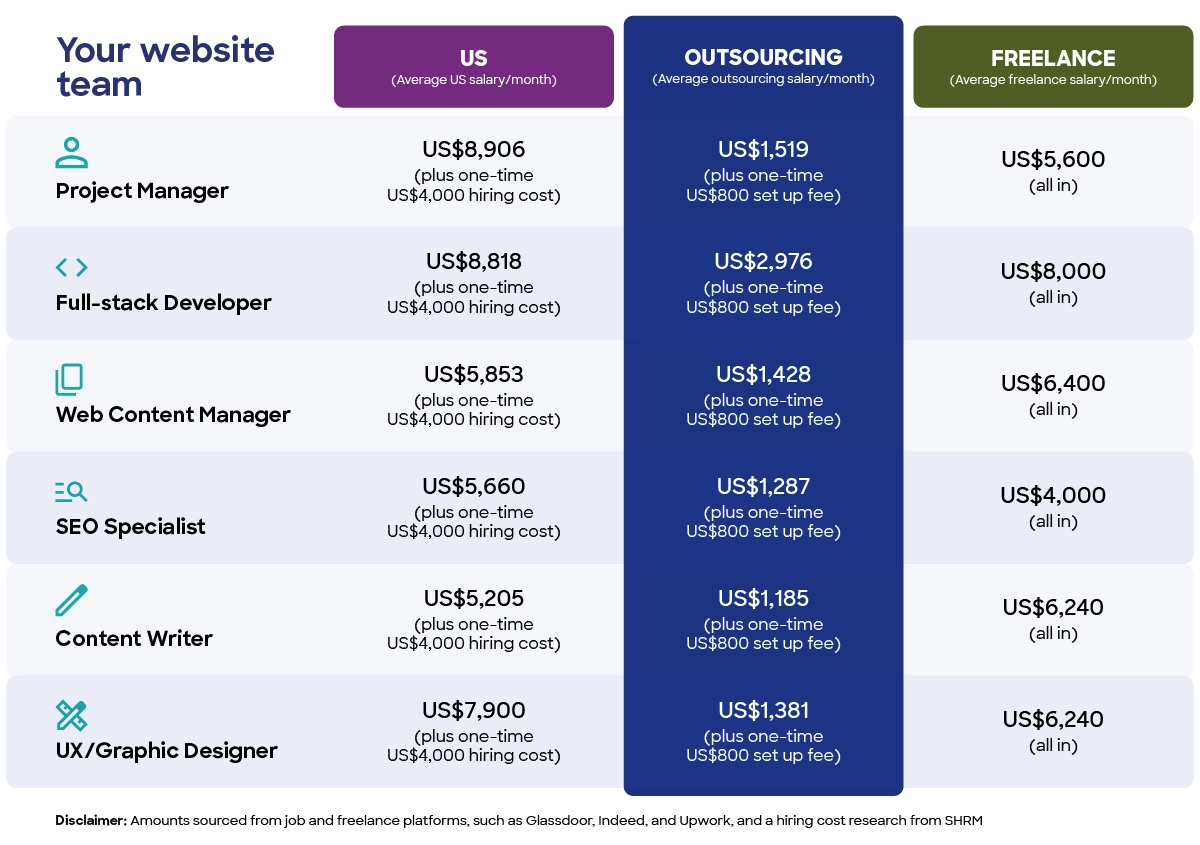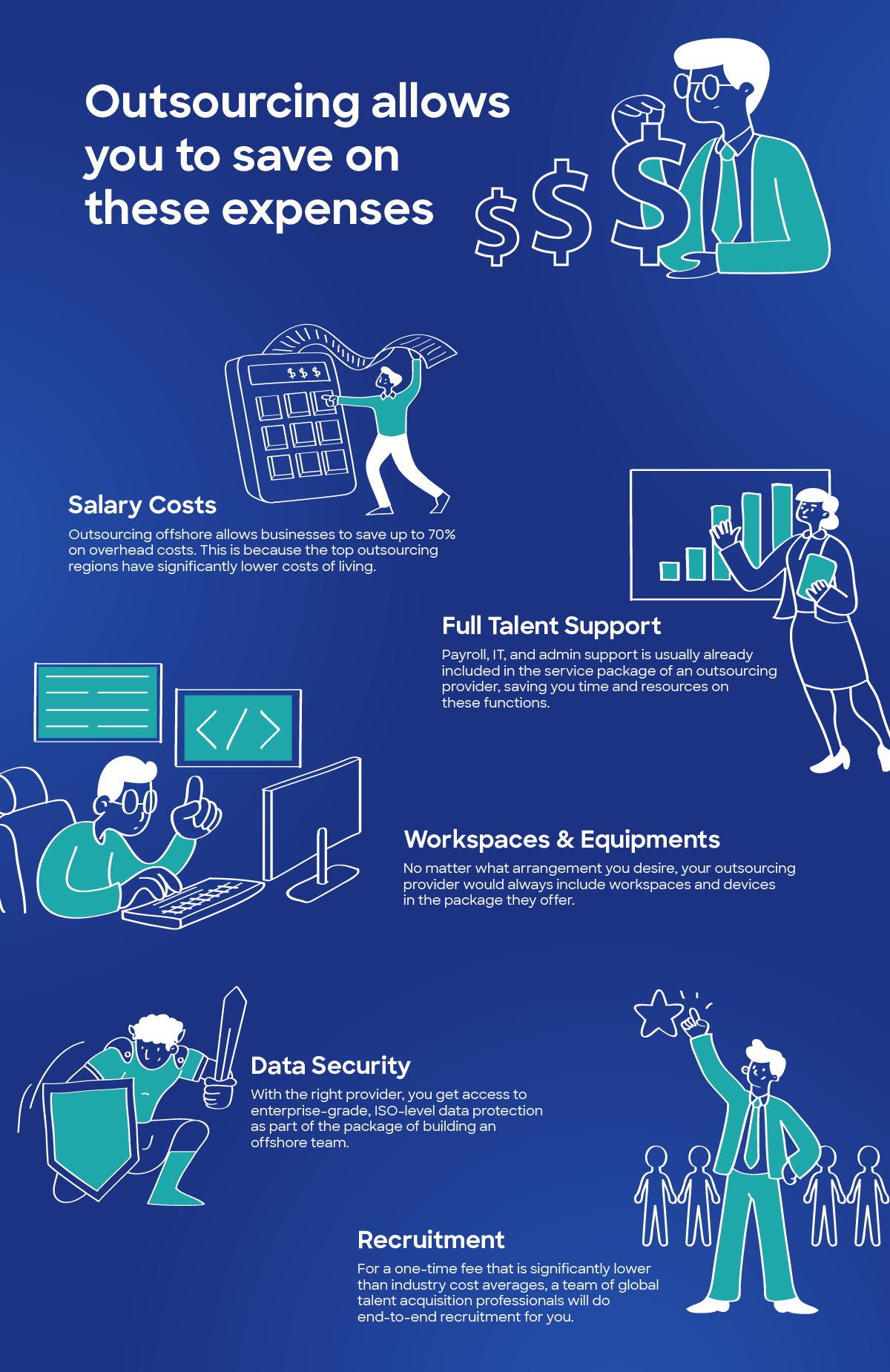Is it smarter to hire freelancers or should I just outsource to an agency?
Hiring has been challenging in the last few years. Rising costs and unpredictable economic trends demand strategies that prioritize both value and adaptability. Freelancing or outsourcing provide great options but basing the decision solely on price neglects the long-term impact on your operation.
For example, most business owners hire freelancers for time-bound projects, like simple website or mobile app development, which usually takes a couple of months to finish, at least from a purely development standpoint.
But when the app or website is up, the need for constant tech support and content production arises, prompting them to look for a more long-term staffing solution, which requires more time and resources – something that could’ve been prevented if they had outsourced a full team from the onset.
That’s just one of the many complex factors that should affect your decision when choosing between freelance and outsourced employees. This, after all, should be an executive decision that requires hours of research, planning, risk mitigation sessions, and a strong effort to make the strategy work.
Freelancing and outsourcing from a cost perspective
While the advantages of both freelancing and outsourcing go way beyond cost savings, it would be a mortal sin to just ignore the amount needed to make these strategies work. After all, hiring freelancers or outsourcing would require a sizeable amount of investment.
Freelancers often have lower upfront costs than outsourcing – that’s undeniable. You save significantly on human resource overhead since the marketplace handles that side. So, if you want to consider hiring freelancers for smaller projects, it can be quite cost-effective.
READ MORE: A closer look at direct hiring, outsourcing, freelancing accountants
For example, let’s talk about simple website creation. The design and build process often only needs short-term talent investment. Contract freelancers offer flexibility here, given those tasks have a clear end date.
But is “practical” truly the best long-term option? The costs of managing those freelancers as the site grows become another question entirely. Here’s a simple table of the estimated cost of roles you’ll need to create and maintain a website from scratch:
If you need talent fast for a short-term project, hiring freelancers through platforms like Upwork is a smart solution. They offer a wide selection of qualified individuals in various price ranges. And best of all, the platform usually handles the fees – no extra payments for you.
Second, most freelancers come equipped with their own software, equipment, and workspaces. This can save you significant costs on technology and office overhead, especially for time-bound projects like website creation.
READ MORE: The difference between full stack, front-end, and back-end developers
But going all in with freelancers might not be the best fit if you see your project becoming a full business function.
Once your website is live, regular maintenance and promotion are essential. While freelancers can handle individual tasks, daily management gets complex as you would need day-to-day tech support and content production, especially when your website is expected to drive long-term lead generation.
Day-to-day operations require engaged, loyal, and skilled workers who can consistently produce for a longer period. For this, you would want to consider a more structured approach, and outsourcing can provide a cost-effective solution.
Outsourcing cuts long-term expenses compared to maintaining a comparable team on individual contracts. Many providers even offer flexible package options for a dedicated team focused solely on your company.
Looking beyond costs
Because the business model requires, freelancers would often choose to handle multiple projects at the same time. And for business functions that need long-term maintenance, production, and scaling, freelancers may not offer the amount of focus you need to thrive in the market.
A dedicated team, on the other hand, can deliver, especially if the provider follows the dedicated staffing model. A result of outsourcing’s evolution over the years, the dedicated staffing model lets you build and manage a customized team: schedules, contracts, even branding are under your control.
Is having such control valuable? Absolutely – especially in a tight talent market where retention is a major business concern. Having full control over your dedicated team gives you more opportunities to integrate and align your staff with your brand, company culture, and values.
The more aligned your team is, the more they value the organization. The more they value the company, the better they perform, and the less likely they are to quit.
READ MORE: Winning the war for talent with a culture-driven approach to outsourcing
Building a dedicated outsourced team provides far more than just talent. You also gain access to modern workspaces, 24/7 administrative and tech support, and customizable data security. These are major advantages, as most freelance platforms simply can’t compete on this level.
Combine that with the outsourcing provider’s readily available talent pools and significant cost savings, and you get a compelling business solution for growth even in a time of uncertainty.
The security factor
Another underrated aspect of outsourcing is security. When you employ freelancers, they usually use their own devices and connections that can be prone to cyber-attacks. When you outsource to a proven provider, you can take control of what devices, software, and connections your team will use.
With the right partner, you can even set up your own data security infrastructure to protect your business from possible data theft.
Outsourcing also offers stability—your team isn’t dependent on a single freelancer who might disappear mid-project. Ever been ghosted by a freelancer? It’s an unfortunate reality of the gig economy. Outsourcing reduces that risk significantly with an accountable business structure.
Naturally, outsourcing services have some costs. But compare that to building a comparable team locally while navigating a tough, limited talent pool. The long-term savings of outsourcing can be massive. Should you consider hiring freelancers instead? It truly depends on your specific goals.
Outsourcing might cost slightly more upfront than a solo freelancer, but the stability, focus, and long-term savings often make it the smarter investment in the long run. The only difference is you get more out of a dedicated team.
READ MORE: Outsourcing doesn’t have to be so far
The quality of talent: Can freelancing or outsourcing deliver?
In the freelance market, you get to choose the person or people you want to work with. Freelancers would list down their skills, capabilities, portfolios, and rates that usually come in packages that depend on the project length and requirements.
If you have in-house talent acquisition experts, then good for you – they can help ensure you find the best freelancers available. But if you’re a startup with zero talent acquisition experience or capability, choosing from the freelance market gets trickier. There’s no guarantee your hire will be the right fit for your project.
However, when you outsource, the provider usually has an experienced team of talent acquisition professionals capable of scouring global talent pools to give you candidates that can match your exact requirements when it comes to skills, experience, attitude, work ethic, and potential.
Yes, freelancing can give you the quality of talent you need, but only if you have the capacity to discern candidates. Outsourcing, on the other hand, can give you talent acquisition prowess of your bigger competitors to ensure your team’s quality.
Making the smart decision
In the end, both freelancing and outsourcing will give you significant savings and the capability to scale in a highly volatile business environment. But whether one is better than the other is not a straightforward answer as it will always depend on your goals.
Strategizing for talent is crucial in thriving today, since the global skills shortage is expected to plague the world of business for the foreseeable future. Moreover, with all the technological advancements, experts are predicting significant changes in skill requirements for businesses in the next five to ten years.
READ MORE: Global business outlook for 2024
A 2023 study by online education platform edX found that all the business executives it surveyed said nearly half of the skills in their existing workforce may no longer be relevant in 2025. They also said that nearly half of their employees need to be prepared for the future of work.
And it’s not just challenges on talent and skills that business leaders are facing, inflation and ongoing geopolitical tensions are contributing to an uncertain global economy. If you’re a smart leader, now is the best time to secure your business.
Yes, investing in technology will be key in navigating the future of business. But remember, technology without talent will always be an empty investment.













